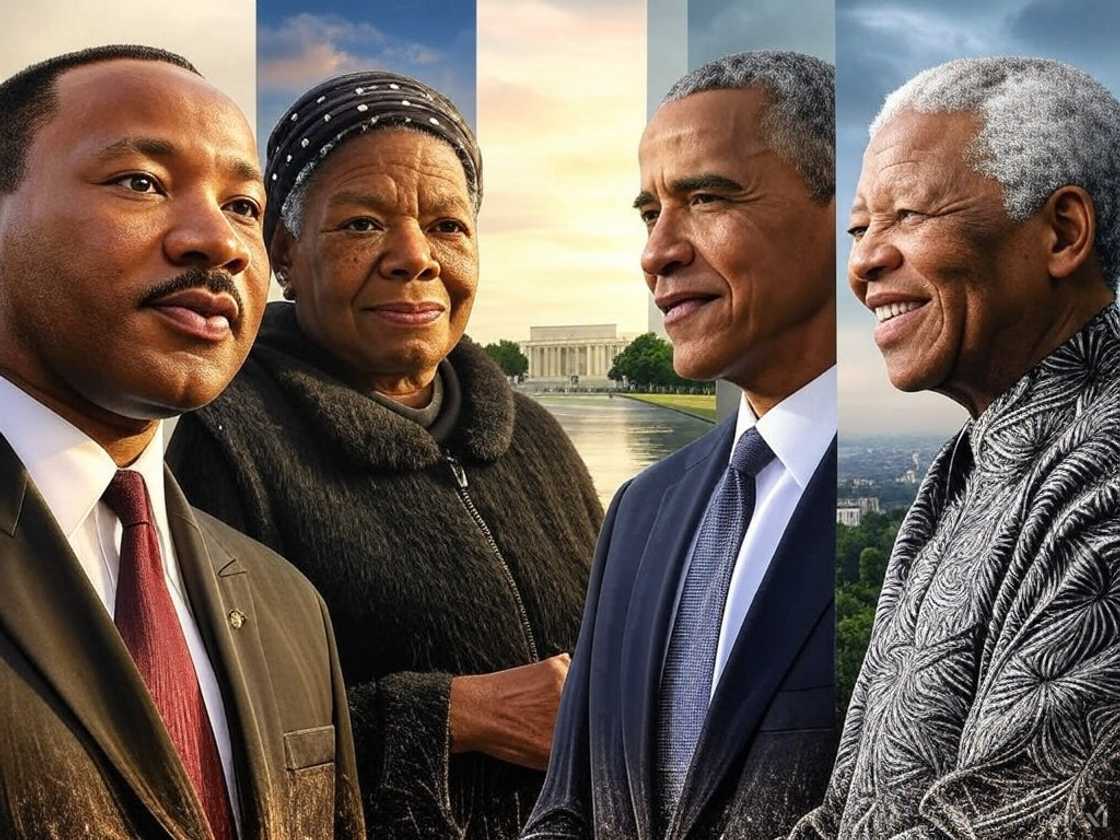Discover Black History Month origin, significance, and the 2025 theme
Black History Month is an annual celebration observed in February in the United States and Canada. However, the United Kingdom and Ireland celebrate the event in October. Each region has its unique way of commemorating and honouring the contributions and achievements of notable Black individuals. Learn more about Black History Month's origin and significance.

Source: Getty Images
TABLE OF CONTENTS
- Key takeaways
- What is Black History Month, and why is it celebrated?
- Origin of Black History Month
- Why did they choose February for Black History Month?
- Which president recognised Black History Month?
- What is the theme of Black History Month in 2025?
- The symbolism behind the Black History Month flag
- 5 interesting facts about Black History Month
- Who are the top 5 Black historical figures?
- Why do we celebrate Black History Month?
- What is this year's theme for Black History Month?
- What is the Black History theme?
- Is Black History Month in Africa?
- How did February get to be Black History Month?
- What happened on February 1st in Black history?
- Is Black History Month in February or October?
- When is Black History Month in the UK?
- What are the colours of Black History Month?
- Do people celebrate Black History Month anywhere else?
- Who is famous in Black History Month?
Key takeaways
- Black History Month is celebrated in February in the US and Canada and October in the UK and Ireland.
- Carter G. Woodson founded Negro History Week in 1926, which later became Black History Month in 1976.
- President Gerald Ford officially recognised Black History Month in 1976, urging Americans to acknowledge Black contributions.
- February was chosen for Black History Month because it coincides with the birthdays of key figures in Black history, Abraham Lincoln (February 12) and Frederick Douglass (February 14).
- The 2025 theme is "African Americans and Labour," highlighting Black contributions in various forms of work, from skilled labour to social activism.
- The Pan-African flag, created by Marcus Garvey in 1920, is widely used to represent Black History Month.
What is Black History Month, and why is it celebrated?
Black History Month is an annual observance honouring the significant contributions of Black individuals and communities to society. It occurs every February in the United States and Canada and October in the United Kingdom.
Commemorators dedicate this month to recognising and celebrating the Black community's rich history, culture, achievements, and resilience.
Origin of Black History Month

Source: UGC
The idea for Black History Month originated with historian Carter G. Woodson and the Association for the Study of African American Life and History (ASALH). It began as Negro History Week in 1926, inspired by a 1915 celebration of emancipation in Chicago.
Woodson established this week (the second week of February) to coincide with the birthdays of Abraham Lincoln and Frederick Douglass. Over time, the week gained popularity, evolving into Black History Month in the 1960s, and became official in 1976.
Why did they choose February for Black History Month?
According to Britannica, February was chosen for Black History Month because it coincides with the birthdays of two prominent figures in Black history: Abraham Lincoln (February 12) and Frederick Douglass (February 14).
Lincoln was the US president who issued the Emancipation Proclamation, and Douglass was a former enslaved abolitionist and influential leader. They both played significant roles in the fight for freedom and civil rights.
Black historian Carter G. Woodson chose February to align with Abraham Lincoln and Frederick Douglass' existing celebrations. He aimed to broaden the study and recognition of Black history.
Which president recognised Black History Month?
President Gerald Ford was the first US president to officially recognise Black History Month in 1976. In 1975, he issued a message on the Observance of Black History Week urging Americans to honour the contributions of Black Americans throughout history.

Source: UGC
President Gerald Ford said in part:
In celebrating Black History Month, we can take satisfaction from this recent progress in the realisation of the ideals envisioned by our Founding Fathers. But, even more than this, we can seize the opportunity to honour the too-often neglected accomplishments of black Americans in every area of endeavour throughout our history.
After President Gerald recognised the month, every other president followed suit. Congress passed the National Black History Month into law in 1986, putting it officially on the calendar. The law intended to make all American citizens "aware of the struggle for freedom and equal opportunity."
What is the theme of Black History Month in 2025?
The theme for Black History Month in 2025 is "African Americans and Labour". This theme focuses on the various and profound ways that work and labour—free and unfree, skilled and unskilled, vocational and voluntary—intersect with the collective experiences of Black people.
The theme highlights the transformational impact of Black labour across the US, Africa, and the diaspora. It also underscores the importance of understanding Black labour in various settings, including:
- Compensated labour
- Community building
- Social justice activism
- Institutional development
The symbolism behind the Black History Month flag

Source: UGC
The Black History Month flag is most commonly the Pan-African flag, also known as the African American Heritage flag. Marcus Garvey created the Pan-African flag in 1920, featuring three horizontal stripes: red, black, and green.
Red symbolises the blood that unites all people of Black African ancestry and shed during liberation. Black represents the people, and green signifies the rich land of Africa.
5 interesting facts about Black History Month
Black History Month is vast and continually growing. Here are five interesting Black History Month facts.
- Black History Month started as Negro History Week in 1926, founded by historian Carter G. Woodson. In 1976, it expanded to a full-month commemoration.
- Carter G. Woodson chose February as it included the birthdays of Abraham Lincoln and Frederick Douglass.
- The US and Canada observe it in February, and the United Kingdom and Ireland celebrate it in October.
- Each year has a specific theme. For example, the theme for 2025 is "African Americans and Labour."
- Black History Month educates people on Black Americans' rich history and culture. It also serves as a time for reflection and discussion about race relations and equality.
Who are the top 5 Black historical figures?
Black history is rich with extraordinary individuals who have impacted various fields. Here are five influential Black historical figures who have left an indelible mark on the world.

Source: UGC
- Martin Luther King Jr. (American Civil Rights Movement leader).
- Harriet Tubman (American slavery abolitionist)
- Barack Obama (44th President of the United States)
- Maya Angelou (poet, singer, memoirist, and civil rights activist)
- Nelson Mandela (South African anti-apartheid revolutionary)
Why do we celebrate Black History Month?
Black History Month is celebrated to honour and recognise the contributions and achievements of African Americans throughout history.
What is this year's theme for Black History Month?
The theme for Black History Month 2025 is "African Americans and Labour."
What is the Black History theme?
Black History Month has a theme to focus attention on specific aspects of Black history and culture each year.
Is Black History Month in Africa?
Black History Month is not typically celebrated in Africa as it is in the United States and other countries.
How did February get to be Black History Month?
February is Black History Month because it coincides with the birthdays of two figures in American history: Abraham Lincoln (February 12) and Frederick Douglass (February 14).
What happened on February 1st in Black history?
On February 1, 1865, President Abraham Lincoln signed the Thirteenth Amendment to the United States Constitution that outlawed slavery.
Is Black History Month in February or October?
Black History Month is celebrated in February in the United States and Canada. The United Kingdom and Ireland observed it in October.
When is Black History Month in the UK?
In the UK, Black History Month is celebrated in October.
What are the colours of Black History Month?
The Black History Month colours are black, red, green, and yellow.
Do people celebrate Black History Month anywhere else?
Yes, Black History Month is also celebrated in Canada in February and the United Kingdom in October.
Who is famous in Black History Month?
Many famous figures are celebrated during Black History Month, including Martin Luther King Jr., Harriet Tubman, Barack Obama, Maya Angelou, and Malcolm X.
Black History Month is a yearly celebration that commemorates the achievements, struggles, and contributions of Black Americans and the wider African diaspora. It started as Negro History Week in 1926 and expanded to a month-long event in 1976. The theme for 2025 is "African Americans and Labour."
Yen.com.gh published a similar article about Black History Month quotes. Black History Month is a time to honour and reflect on remarkable African American trailblazers who have left lasting legacies by igniting a desire for change and hope.
Black History Month serves as a reminder to reflect on Black people's struggles, triumphs, and invaluable accomplishments. Read the article to discover some inspiring quotes that capture the wisdom of those who paved the way for advancement and equality.
Source: YEN.com.gh

Simon Ayub (Project Manager) Simon Ayub is an adept content strategist and writer who generates content mainly focusing on the Facts and Life Hacks category. With over half a decade of creating relatable content for various brands, Simon has amassed sufficient knowledge to give every website a palpable spark – ample precedence for an ever-growing audience. Simon holds a BSc in Agricultural Economics and is a Certified Public Accountant. He studied SEO tactics and analytics out of his love for writing.

Chris Ndetei (Lifestyle writer) Christopher Ndetei is a writer who joined the Yen team in May 2021. He graduated from Machakos Technical College in 2009 with a Diploma in ICT and has over four years of experience in SEO writing. Christopher specialises in lifestyle and entertainment coverage, with a focus on biographies, life hacks, gaming, and guides. He has completed the AFP course on Digital Investigation Techniques (2023) and earned the Google News Initiative Certificate (2024). In recognition of his work, he was named Yen Writer of the Year in 2024. You can connect with him via email at chrisndetei@gmail.com.







